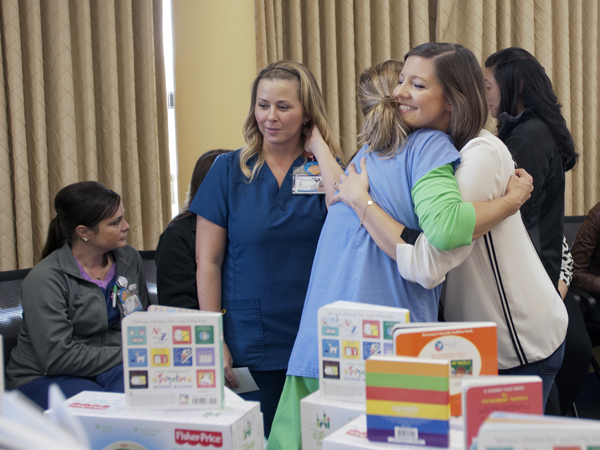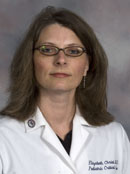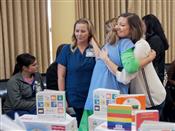Looking after grieving family a priority for PICU staff

On November 6, Lauren and Wes Clay should’ve been celebrating their son John Pearson’s first birthday.
Instead they visited the pediatric intensive care unit at Batson Children’s Hospital, where John Pearson died this past March of complications from a congenital heart defect.
And while the visit was hard for the Clays, it was also healing for them to be around the many familiar faces – people they came to know as friends during their five-month stay there.
The PICU staff would have it no other way.
When a child dies after a stay in the PICU, one might assume the efforts of the child’s health-care team would end. But for Batson’s PICU team, which operates within a family-centered care paradigm, their attention simply shifts more squarely to those who grieve.
“We’re just trying to take care of the families,” said Pam Courtney, R.N. and co-chair of the PICU’s Bereavement Committee. “It goes far beyond bereavement.”
The Bereavement Committee, created in the late 1990s, brings structure and organization to practices already in place to help grieving families. Nearly every single person on the PICU staff is a member.
Some of those practices actually begin before the child’s death and, as Courtney mentioned, extend far beyond those terrible days when a child dies.
Lauren Clay recalls the nurses periodically giving them John Pearson’s footprints and handprints throughout his stay in the unit. It seems like a small gesture, but Clay said she and her husband were so concentrated on John Pearson’s health that they never thought to do it, and now she cherishes the memento.
“The nurses took the time to do these things and I don’t feel like I missed out on things like getting footprints. I didn’t even ask for them. They just did them and that was so special.”
When a child does die, Courtney said the committee tries to give the family whatever they want to keep of their child’s, whether it’s just the hand- and footprints or a lock of hair.
The committee also gives the family information on how and where to find grief support, for parents as well as siblings and grandparents.
But that’s not where the help ends.
For the next year following the child’s death, a member of the committee – often a nurse who took care of the child – sends cards signed by everyone in the unit on the child’s birthday and other holidays like Thanksgiving, Christmas, Mother’s or Father’s Day.
“We want to hit hard times when they’ll be missing the child,” Courtney said. “Just to let them know we’re thinking of them.”
The final card goes out on the anniversary of the child’s death.

Christ
Dr. Elizabeth Christ, professor of pediatrics and medical director of the PICU, who helped start the committee in 1998, said cards and notes started as a way to help families and staff alike.
“Hopefully, it helps the families to feel like their child was important and not forgotten,” she said. “I think it helps the staff to feel they are doing something to remember the kids and gives a degree of closure, especially if they knew the family.”
And on the flip side, Courtney said, being part of the committee helps the staff members as well, functioning as a support group of sorts.
“If we’ve had a really tough case, we will have a debriefing where anyone who wants to can come up here and we meet with some of the PICU doctors. We just have a time to sit down and talk about the child, talk about how we’re feeling,” she said.
Courtney plans to expand the committee’s efforts.
Committee members recently held a T-shirt sale that raised nearly $1,000. The money will be used to purchase keepsakes that can be given to the family to memorialize their child – for example, committee members used to give grieving families little ceramic hearts that contained smaller hearts to be placed in the casket with the child.
They’ve lost touch with the man who supplied those hearts, but they’re looking at other options such as journals or memory books to put photos and thoughts into for the families.
Courtney said if funding were not an issue, she’d like to start a support group for families and maybe even have a reunion that the families can come back to every year.
The Clays would likely be in attendance. She says staying connected to the PICU staff is healing for her.
“For me, they became my family. No one really knew what was going on as much as they did and they loved him as much as I did,” Lauren Clay said.
She noted that not seeing the PICU staff everyday felt weird to her.
“They see you at your worst and at your best. No one really understands what you’re going through besides them.”
Photos
 | High Resolution Medium Resolution Low Resolution |


